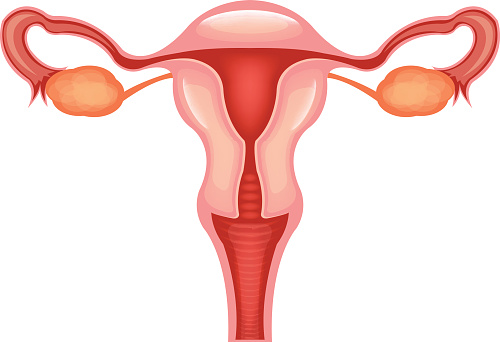
Female reproductive system. Vector flat illustration
Transvaginal mesh is a medical device used in the treatment of pelvic organ prolapse and stress urinary incontinence in women. It is a net-like implant made of synthetic materials, such as polypropylene.
It is surgically placed through the vagina to provide support and reinforcement to weakened or damaged pelvic tissues. The use of transvaginal mesh has been controversial due to reported complications and adverse effects experienced by some patients.
These complications can include mesh erosion, organ perforation, chronic pain, and infection. As a result, concerns have been raised regarding the safety and efficacy of transvaginal mesh, leading to regulatory actions and legal cases.
This article will look at its potential health risks, case studies, and lawsuits filed against the device.
Banning of Transvaginal Mesh
In 2019, the FDA commanded an immediate stop on the sales and distribution of transvaginal repair mesh for pelvic organ prolapse (POP). However, it is still used in treating stress urinary incontinence (SUI) in a sling procedure.
The FDA reclassified transvaginal mesh for pelvic organ prolapse into high risk after finding that the manufacturers, Boston Scientific and Coloplast, had not provided reasonable assurance of the device’s safety and effectiveness.
Despite Coloplast mesh devices being taken off the market, the FDA published a final report in October 2022 regarding its efficacy and safety. According to the FDA, there is a risk of erosion and mesh exposure with these devices.
Global Restrictions on Vaginal Mesh
As public concern over transvaginal mesh grew and reports of difficulties increased, some nations implemented bans and limits on the device.
Australia banned transvaginal mesh for prolapse in November 2017 which was followed by New Zealand banning the mesh in December 2017.
July 2018 saw the pause in all mesh operations in England. In June 2019, the U.K. updated the hold on transvaginal mesh. Canada restricted transvaginal mesh in July 2019.
Problems Caused by Transvaginal Mesh Implants
Transvaginal mesh use has resulted in serious medical issues for some patients. According to the FDA, 2,874 reports of malfunctions, deaths, injuries, and other issues related to transvaginal mesh had been received, reports the Better Health.
These include:
- Irregular vaginal bleeding or discharge
- Discomfort during sex
- Bladder and bowel problems like infection and incontinence
- Abdominal, buttock, or leg pain
- Pelvic pain or swelling
A Call for Help: Victims of Implant Injuries
In a report by BBC published in February 2024, campaigners are urging for support and justice for women who have suffered injuries from pelvic mesh implants.
Jemima Williams, who has endured chronic pain for over 20 years, emphasizes the need for a patient safety commissioner in Wales to ensure patient’s voices are heard.
Despite progress in England and Scotland, the Welsh government currently has no plans to appoint a patient safety commissioner.
Women like Karen Preater, who has been in constant pain since receiving mesh implants, emphasize the importance of having an advocate to avoid arduous battles for justice.
While the Welsh government expresses sympathy, it highlights existing patient safety measures and pledges to pursue appropriate action if the UK government accepts the recommendations.
Vaginal mesh use has been halted in Wales since 2018, and the advice against valproate use in pregnancy is in effect.
Transvaginal Mesh Lawsuit
When the US Food and Drug Administration first warned of major risks related to transvaginal mesh in 2008, thousands of lawsuits were filed. Seven federal multidistrict litigation cases were formed out of the majority of vaginal mesh lawsuits against the major manufacturers.
Other settlements included many multi-state agreements that were not filed in federal court and one that resolved 20,000 cases for $830 million. Nonetheless, there are still opportunities for new vaginal mesh lawsuits, and attorneys are pursuing them with varying degrees of success.
Settlement Amounts
Depending on the circumstances of each case, the transvaginal mesh settlement amounts range between $150,000 to over $400,000.
A variety of damages, such as medical bills, future treatment costs, mental distress, pain and suffering, and more, may be sought by anyone affected by issues with vaginal meshes.
According to TorHoerman Law, damages, which are defined as both measurable and immeasurable losses, are represented by the sums granted in vaginal mesh lawsuits.
Frequently Asked Questions (FAQs)
Why is transvaginal mesh controversial?
Transvaginal mesh has been controversial due to reported complications and adverse effects experienced by some patients. These complications can include mesh erosion, organ perforation, chronic pain, infection, and other issues.
What are the potential health risks associated with transvaginal mesh?
Transvaginal mesh implants have been associated with various health risks, including mesh erosion, organ perforation, chronic pain, infection, vaginal bleeding or discharge, discomfort during sex, bladder and bowel problems, and abdominal or pelvic pain. These risks can have a significant impact on a patient’s quality of life.
What should I do if I have experienced complications from transvaginal mesh?
If you have experienced complications or adverse effects from transvaginal mesh, it is important to seek medical attention and consult with a qualified attorney specializing in transvaginal mesh lawsuits. They can guide the legal options available to you and help you navigate the process of seeking compensation.
Looking at the potential risks of transvaginal mesh, it is advised to look at some of the surgical and non-surgical alternatives to it. Some of them are, Burch Colposuspension, Pelvic Floor Therapy, and Pessary.
By opting for effective alternatives, you may save yourself or someone you know from the dangers of vaginal mesh implants. So choose wisely!
Stay in touch to get more updates & news on Buzz!

